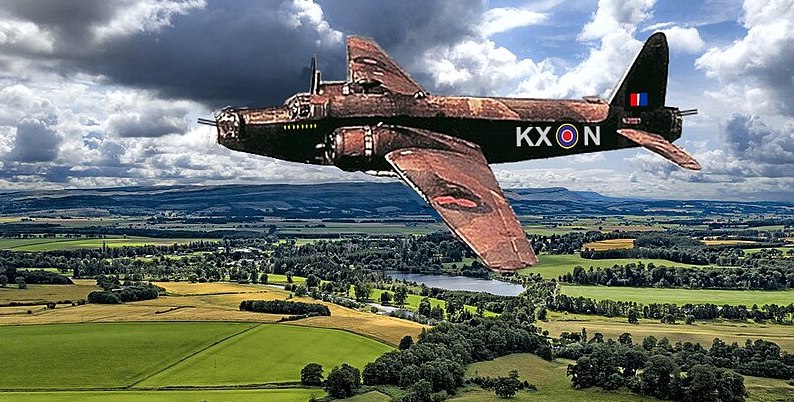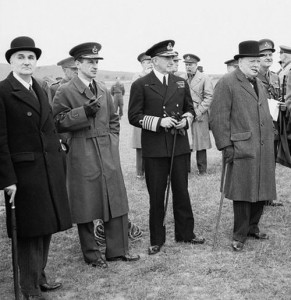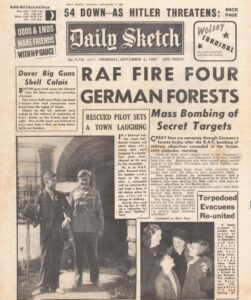
Myths and Heresies: “Firebombing the Black Forest”
This article was first publsihed by the Hillsdale College Churchill Project as “Opium for the People: The Myth of Firebombing the Black Forest.” Ordinarily I reproduce only excerpts from my Hillsdale articles, but this subject involves serious allegations in need of correction. Accordingly, it appears below in entirety. To subscribe to weekly articles from Hillsdale/Churchill, click here, scroll to bottom, and enter your email in the box “Stay in touch with us.” We never spam you and your identity remains a riddle wrapped in a mystery inside an enigma.
Churchill as Mad Bomber (again)
The Internet bubbles again with that old time religion: Winston Churchill, graduate Germanophobe, ensured today’s troubled world by stubbornly refusing to stop fighting Hitler.
The idea is not new. Churchill’s sin was limned in Francis Neilson’s The Churchill Legend (1954). Cambridge’s Maurice Cowling added The Impact of Hitler (1975)—enthusiastically endorsed by Alan Clark MP, David Irving portrayed the misunderstood Führer in Churchill’s War (1987). Ralph Raico produced “Rethinking Churchill” (Mises Institute, 1990). John Charmley’s Churchill: The End of Glory (1993) channeled Cowling, within a thoughtful appraisal of Churchill’s whole career. Pat Buchanan piled on with Churchill, Hitler and the Unnecessary War (2008). Curiously, all these critics were from the right, where Churchill is often deemed to reside.
So the vision of Churchill as maximum villain is longstanding. What is new is its viral appearance in an interview by popular podcaster, Tucker Carlson, who has an unprecedented reach on YouTube and the worldwide web.
Adolf Hitler was just misunderstood, argues the “historian” interviewed. He only invaded Poland because Chamberlain and Churchill forced him. He never wanted to conquer France. No sooner had he done so than the Luftwaffe dropped peace leaflets on Britain. The Germans were baffled over what to do with millions of Russian prisoners because Churchill kept fighting long enough to bring Stalin in. (Hence the death camps.) Then Churchill got America involved. The result was fifty million dead and fifty years of Cold War.
Pushback to this has been massive—most expertly by the historian Victor Davis Hanson. Here we consider just one of Cooper’s unique charges: that in his bloodlust, Churchill firebombed Germany’s Black Forest. (We hadn’t heard that one before.)
Black Forest redux
Everybody likes trees. Churchill himself said, “No one should ever cut one down without planting another.”1 Inevitably, the charge that he wiped out a forest in a burst of impulsive firebombing tugs at the heartstrings. But did he?
To be scrupulously accurate, here is an exact transcription of the charge in question:
[Churchill] was literally by 1940 sending firebomb fleets to go bomb the Black Forest, just to burn down sections of the Black Forest. Just rank terrorism, you know, just going through what eventually became saturation bombing, carpet bombing of civilian neighborhoods, you know, the purpose of which was to kill as many civilians as possible. And all the men, the fighting age men, were out in the field. So this was old people, women and children, and they were wiping these places out as gigantic-scale terrorist attacks, of a scale you’ve never seen in world history.
Get it? Nobody was left in the Black Forest but women, children and the aged. Winston Churchill was bent on wiping them out. Now let’s look at the facts.
Bombing “private property”
In mid-August 1939, Churchill and General Louis Spears visited France as private Members of Parliament. Spears recalled: “We gazed across the Rhine at the immense Black Forest which, the French told us, was full of ammunition dumps. Loaded convoys were for ever driving into its depths and coming out empty.”2
The Black Forest (Schwarzwald) in southwest Germany spans 2300 square miles (roughly 100 by 30). Rich in timber and ore deposits, it has been fortified since the 17th century. In 1939-40 it housed the Wehrmacht High Command (OKW), Hitler’s headquarters after France surrendered.3 So much for the vision of bucolic timberland populated by aged civilians, women, children and clockmakers.
When war began, General Spears and Leopold Amery urged Chamberlain’s Air Minister, Sir Kingsley Wood, to bomb Black Forest ammunition dumps. Amery, wrote Spears,
was well aware that that vast wooded area was packed full of munitions and warlike stores. He suggested we should immediately drop incendiary bombs on to it. It had been a very dry summer, he pointed out, and the wood would burn easily, but the rain might come at any moment and a unique chance might be lost, probably for ever. Kingsley Wood turned down the suggestion with some asperity. “Are you aware it is private property?” he said. “Why, you will be asking me to bomb Essen next!”4
This, continued Spears, threw “astounding light on the mentality of Munichers [Chamberlain ministers] at war…” Woods’s “private property” remark was later quoted without elaboration by Harold Macmillan, William Manchester and Lynne Olson.5
What Kingsley Wood actually said
Unlike the above writers, the historian John Charmley dug deeper: “In fact, Sir Kingsley actually told Amery that the Government would not bomb civilian areas for fear of alienating American opinion, which was a perfectly sensible answer; but any stick would do to beat the appeasers.”6
Amery in his diaries did refer to Woods’s “private property” remark7. But Charmley had read further, and noticed that Amery had second thoughts:
I think also mentioned the fact that they had munition dumps there, though my main argument was to deprive them of timber. I cannot remember whether [Sir Kingsley] spoke about it being private property, but if he did it may well have been in order to put me off the fact that the French were desperately anxious to have nothing to do with bombing till their own anti-aircraft defences were better…. What I do remember was that I was very indignant, for it seemed to me essential on moral grounds, if on no others, that we should try and do something to help the Poles.8
Ah, the Poles! Remember them? Lost in the recent podcast was the fact that Poland was being systematically obliterated by Hitler’s Wehrmacht. Chamberlain had “guaranteed” the Poles—without military means to do so: a decision, Churchill wrote, “taken at the last possible moment and on the least satisfactory ground, which must surely lead to the slaughter of tens of millions of people.”9
Amery’s sympathy for the Poles is perfectly understandable. If we were not present at that time, we should at least try to put ourselves into the shoes of those who were.

“Not how Churchill waged war”
Even with Churchill in the Chamberlain government, wrote the press baron Cecil King, there was little appetite for offense during 1939: “Many plans were debated—and rejected: floating mines down the Rhine; setting the Black Forest on fire; bombing Russian oil wells in Baku (to stop Hitler getting the oil); even sending an expeditionary force to aid the embattled Finns.”10
The Chamberlain government’s reluctance, Charmley wrote, “was all part of the Allied strategy of sitting it out and waiting for Hitler either to collapse or to bang his head on the Maginot Line. But this was not how Churchill waged war.”11 Quite so.
Churchill replaced Chamberlain on 10 May 1940, and the change was palpable. Now they ignored no form of office. On 11 June, with France nearing collapse, the War Cabinet authorized an RAF attack on the Black Forest “with incendiary bombs.”12 According to the Air Ministry, the object was “military stores standing in the open at arsenals and ammunition factories or supplies in open railway cars or trucks and similar objectives.” The enemy “concealed such targets in woods.”13
A trial Black Forest raid on 30 June 1940 was a failure. Some incendiaries caught in the bomber’s slipstream and blew onto the tailpipe elevators, causing a fire. The damaged plane returned to base.
In “Operation Razzle,” 2-4 September, ten Wellingtons firebombed a few woodlands including the Black Forest—again without result. The timberland was “not easily ‘fired’ as its trees are mainly deciduous.”14
This is what the recent podcast described as “firebomb fleets” causing “rank terrorism” in “civilian neighborhoods.”

Razzle abandoned
While British and American newspapers reported “mass firing” and “new secret weapons dropped in millions,” the reality was very different. In fact, noted Berlin LuftTerror,
just a few fields had been burnt and that the fire didn’t spread much and as fast as desired following the first sorties. London quickly decided that Razzle did not possess war-winning potential, and was consigned to the ‘it was worth a try’ file.”15
With the September threat of a German invasion of Britain, the bombers turned to targets on the Channel coast. A year later, Hitler’s invasion of Russia again prompted Churchill to “make hell while the sun shines.” Prodded by H.G. Wells, he inquired of Air Marshal Portal: “What is the position about bombing of the Black Forest this year? It ought to be possible to produce very fine results.”
This was the first time Churchill, rather than one of his colleagues, raised the question. It went nowhere. Portal reminded him of 1940’s failure—and that the Black Forest was over 400 miles from the Channel. Closer targets beckoned.16
“Opium for the people”
So the fiery holocaust, the “fleets of bombers” over the Schwarzfeld, the maniacal burning of helpless women and children described by this podcast, never happened. Even the Air Ministry’s proclaimed objectives—“military stores, arsenals, ammunition factories, railway cars”—remained unmolested. Military targets are fair game in war; these remained untouched.
As Andrew Roberts and others comprehensively documented, this is not serious “history.” Permit me to quote a colleague who long ago dispelled similar falsehoods about Churchill and Pearl Harbor:
Allow me to vent for a moment. The reason why this kind of nonsense passes for history is that standards for evidence have virtually disappeared. Not all evidence is equal and there is an obligation to weigh evidence against some reasonable standard.
The standard is not exactly rocket science. Remnant evidence is better than tradition-creating evidence. Corroborated testimony is better than uncorroborated testimony. Forensic evidence is better than hearsay.
Our inability to be skeptical, to think critically, to ask questions, to compare and contrast, leads to the perpetuation of one urban legend after another, be it Churchill and Coventry, Churchill and the Lusitania, Churchill and Pearl Harbor, etc. Hard thinking, critical analysis, and skepticism are the only ways to challenge this rubbish. I sometimes despair. Vent off.17
Endnotes
1 Churchill at St. Barabas School, Woodford, 6 September 1952, in Richard M. Langworth, ed., Churchill by Himself (New York, Rosetta, 2015), 332-33.
2 Louis Spears, Assignment to Catastrophe, 1 vol. ed., London, Reprint Society 1956, 19.
3 Peter Fleming, Invasion 1940 (London: Rupert Hart Davis, 1956), 47.
4 Spears, 43. Harold Macmillan, The Blast of War 1939-45 (London: Macmillan, 1967), 8.
5 Macmillan, ibid. William Manchester, The Last Lion, Winston Spencer Churchill, vol. 2, Alone 1932-1940 (Boston: Little Brown, 1988), 578. Lynne Olson, Troublesome Young Men (New York: Farrar, Straus & Giroux, 2007), 224.
6 John Charmley, Churchill: The End of Glory (Sevenoaks: Hodder & Stoughton, 1993), 374.
7 Leopold Amery, My Political Life, vol. 3, The Unforgiving Years 1929-1940 (London: Hutchinson, 1955), 330.
8 John Barnes & David Amery Nicolson, The Leo Amery Diaries, vol. 2, Empire at Bay 1930-45 (London: Hutchinson, 1988), 559-60.
9 Langworth, 261.
10 Cecil King, With Malice Toward None: A War Diary (London: Sidgwick & Jackson, 1970), 2.
11 Charmley, 374.
12 Martin Gilbert, Winston S. Churchill, vol. 6, Finest Hour 1939-1941 (Hillsdale, Mich.: Hillsdale College Press, 2011), 498.
13 Air Ministry communiqué (Associated Press), The New York Times, 11 September 1940, 1.
14 Gilbert, 711. For a detailed description of Operation Razzle, see the blogsite Berlin LuftTerror, a balanced account of the air war against Germany (accessed 6 September 2024).
15 BerlinLuftTerror, ibid.
16 Gilbert, 1123-24.
17 Ron Helgemo, “A Review of Betrayal at Pearl Harbor by the History Channel, 7 December 1998, in Finest Hour 101, Winter 1998-99.
Audio and video
Andrew Roberts Debunks the Myths on School of War.
Rafal Heydel-Mankoo, “War Over Churchill” on Outspoken.
Related reading
Victor Davis Hanson, “The Truth About World War II,” 2024 (Free Press)
Andrew Roberts, “No, Churchill was Not the Villain,” 2024 (Washington Free Beacon).
Michael McMenamin, “Rumbles on the Right: The Raico Case Against Churchill,” 2022.
Richard M. Langworth, “Pat Buchanan and the Art of the Selective Quote,” 2023.
Herbert Anderson, “A New Gospel of Churchill Perfidy by Otto English,” 2022.






